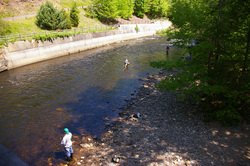
To many people, trout fishing is as American as hot dogs, apple pie and baseball. Art Lee claims that trout fishing is “American’s favorite form of outdoor recreation” (Lee, 1998, p. xvii). Still, before we grab our fly fishing rods and demand entry into the Fourth of July Parade, we should keep in mind that hot dogs, apple pie and baseball are not really that American in the first place. When we look more closely we realize that our beloved frankfurters and associated hamburgers are named for two Germany cities. Although there is some debate over who actually created the first hot dog, it seems very likely the idea originated in Germany or Austria, not the good old U.S. of A. Similarly, the apples in our homemade pies were originally introduced to America from Asia. They eventually arrived, like the brown trout, on boats from Europe. Baseball is truly a domestic sport, but has obvious origins from the older English games of cricket and rounders. Baseball has also been recently tainted by the revelation of the use of steroids by many players, but that is true of trout rearing too. In comparison, Izaak Walton wrote the single most famous angling book, The Compleat Angler, in 1653 only 33 years after the Pilgrims landed on Plymouth Rock. Native Americans were fishing long before the first European settlers arrived, but many of the modern fishing techniques, that include the fishing rod, originated overseas. Clearly, the major fishing clubs and some of their most famous members often looked to England as a source of inspiration. Yet many people still firmly believe in the patriotism of these various borrowed traditions.
In many cases, the American patriotism associated with fly-fishing, assumes an air of elitism. One writer states that “it was on American streams that fly casting as an art in itself began to assume a place of special importance” (Brooks, 1985 p. 19). In a similar sentiment another well-know professional angler suggests that “well traveled American fly fishermen are the most accomplished practitioners of the sport on earth” (Lee, 1998 p. 19). In comparison the author mentions his “impression of the typical British angler as being rather staid” (Lee, 1998 p. 245). It is clear that some differences developed over the years in the type of equipment used here versus over the pond. One author talks about the different length fly-fishing poles used by British and American anglers, and has a clear bias towards the shorter lighter rods used in the states (Brooks, 1985). Whether all the chest thumping really matters is another question.
If we look today at the general status of trout fishing in the United States and the role of economic and social status, no single individual or event represents the so-called smoking gun to prove discrimination. However, the cumulative efforts of many wealthy and politically-connected people managed to remove from the public trust large segments of the country’s most desirable and fishable waters. The funds to acquire these lands came from many different sources, but certainly a sizable portion can be directly linked to commercial and industrial activities that caused more environmental damage than was ever rectified by preserving rivers through privatization. We will never know the true intentions or motives for many of these millionaire’s actions, but it is hard to argue many of these affluent anglers deserve the modern label of environmentalists. The role that social aspirations and desires for upward mobility played cannot be ignored. It seems much more fitting to describe these fishy folks as elitists. In a country where wealth, success and happiness are such interconnected concepts, it is interesting to think how much of our traditions are inherited from Europe.
In many cases, the American patriotism associated with fly-fishing, assumes an air of elitism. One writer states that “it was on American streams that fly casting as an art in itself began to assume a place of special importance” (Brooks, 1985 p. 19). In a similar sentiment another well-know professional angler suggests that “well traveled American fly fishermen are the most accomplished practitioners of the sport on earth” (Lee, 1998 p. 19). In comparison the author mentions his “impression of the typical British angler as being rather staid” (Lee, 1998 p. 245). It is clear that some differences developed over the years in the type of equipment used here versus over the pond. One author talks about the different length fly-fishing poles used by British and American anglers, and has a clear bias towards the shorter lighter rods used in the states (Brooks, 1985). Whether all the chest thumping really matters is another question.
If we look today at the general status of trout fishing in the United States and the role of economic and social status, no single individual or event represents the so-called smoking gun to prove discrimination. However, the cumulative efforts of many wealthy and politically-connected people managed to remove from the public trust large segments of the country’s most desirable and fishable waters. The funds to acquire these lands came from many different sources, but certainly a sizable portion can be directly linked to commercial and industrial activities that caused more environmental damage than was ever rectified by preserving rivers through privatization. We will never know the true intentions or motives for many of these millionaire’s actions, but it is hard to argue many of these affluent anglers deserve the modern label of environmentalists. The role that social aspirations and desires for upward mobility played cannot be ignored. It seems much more fitting to describe these fishy folks as elitists. In a country where wealth, success and happiness are such interconnected concepts, it is interesting to think how much of our traditions are inherited from Europe.
 RSS Feed
RSS Feed
